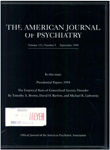A double-blind crossover trial of imipramine and phenelzine for outpatients with treatment-refractory depression
Abstract
OBJECTIVE: Data from controlled studies concerning the response rates of patients to a second antidepressant medication after they have been unresponsive to a systematic trial of another antidepressant are extremely useful to clinicians for rational prescription of pharmacotherapy. Such information allows making an accurate prognosis, sustaining realistic hope in the patient, and achieving the best possible therapeutic outcome. This study was designed to add to the scanty literature available on this subject. METHOD: Eighty-nine mood- reactive, nonmelancholic, mainly chronically depressed outpatients at a university research clinic who were unresponsive to vigorous double- blind trials of imipramine or phenelzine were crossed over to treatment with the other drug under double-blind conditions. RESULTS: Of 46 patients previously unresponsive to imipramine who completed phenelzine treatment, 31 (67%) responded to phenelzine. Of 22 patients previously unresponsive to phenelzine who completed imipramine treatment, nine (41%) responded to imipramine. The difference in response rates was statistically significant. Even after they had shown no response to 7 weeks of placebo and 6 weeks of imipramine treatment, 10 (83%) of 12 patients who then completed treatment with phenelzine responded. CONCLUSIONS: These data suggest that among chronically ill, mood- reactive depressed patients with many symptoms of atypical depression, phenelzine is strikingly effective in those who have been nonresponders to imipramine and should be tried in such patients.
Access content
To read the fulltext, please use one of the options below to sign in or purchase access.- Personal login
- Institutional Login
- Sign in via OpenAthens
- Register for access
-
Please login/register if you wish to pair your device and check access availability.
Not a subscriber?
PsychiatryOnline subscription options offer access to the DSM-5 library, books, journals, CME, and patient resources. This all-in-one virtual library provides psychiatrists and mental health professionals with key resources for diagnosis, treatment, research, and professional development.
Need more help? PsychiatryOnline Customer Service may be reached by emailing [email protected] or by calling 800-368-5777 (in the U.S.) or 703-907-7322 (outside the U.S.).



